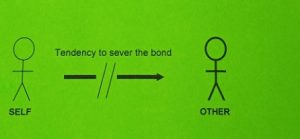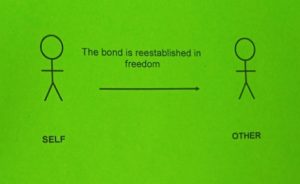Psychological Balance: How To Migrate From Dependency To Autonomy

Migrating from the dependency stage to a stage of autonomy is one of the crucial moments in ones life. In most areas of our lives, we are almost dependent on ourselves as social beings for means of survival but that does not refute the fact that we are always seeking to know how to migrate from dependency to autonomy.
It is not always an easy road but in one way or the other, we are never autonomous, we still need others in many crucial stages and situations. Many people play an essential role in the building of our personality. Not all others however: those whom we perceive as being important to us, that is, those to whom we give importance and by this very fact, allow them to influence us. By “others” we mean persons or groups.
What Can Prevent Us From Becoming Our Real Selves
There are three groups of people who can either help us in achieving our real selves or becoming another version of ourselves. The ones who help us are:
- loving persons; they accept us as we are, as a whole. They are interested in who we are, including what they marvel at, what astonishes and bothers them, and for what we can become;
- solid persons who do not panic in the face of what we live or say about ourselves. They are able to keep their gaze on what aspires to live in us and are able to remain in an adult relationship in spite of what may be awakened. They lead their lives with assurance;
- genuine persons; they do not seek to be loved at all costs, and are capable of remaining close in all circumstances.
Others can hinder us, either by having attitudes opposite to those mentioned above or by having us live in a world of false beliefs concerning the human being, relationships, inner experience, life, etc. The same person can be helpful in certain aspects and not helpful, or even harmful in others.
How To Migrate From Dependency To Autonomy
The stages on how to migrate from dependency to autonomy is not an easy step but it takes a lot of psychological and physical maturity to be able to attain the height. The following description applies to children, but also to certain adults who have not yet attained psychological maturity and who are searching for autonomy.
Dependency
Dependency stage is a particular stage in life where all physical, spiritual, moral, psychological and social need is gotten from a higher source. We can distinguish two types of dependency:
The dependency of an apprentice: Children are born helpless. They are rich in potentialities. But in order to live these, they must be accompanied in their learning. During this stage, they need to learn everything: everyday actions, a trade, knowledge in all areas, attitudes to live in society, etc. They are dependent on their parents and educators. This phase of apprenticeship can have two possible outcomes:
- If educators know how to help children discover who they are and get them to experience confidence in their being, they launch them on the road to autonomy and freedom.
- If educators do not have this attitude, if they continue to dominate them, and if they seek to remain their centre of reference, even if this is intended to be for the children’s own good, or if they allow the child to dominate them, they affect their life dynamism and stifle their development.
- Let us underscore that this need for apprenticeships lasts for the duration of our whole life, as new personal capacities emerge. In fact, adults also need, in order to develop all their capacities, to learn from persons having the knowledge they need.
Psychological dependency: There comes a time when persons feel ready to assume the capacity to decide for themselves, to assume their autonomy, at least partially. To remain dependent, after having acquired the ability to govern their own life, is to live psychological dependency: for example, they do not give their opinion when they have one, remaining dependent on the other’s opinion, while knowing what is to be done.
Responsibility for this type of dependency can be attributed mainly to educators who want to maintain their control, or to persons themselves who do not dare take a distance, due to insecurity and fear of offending those to whom they feel obligated, or, it could be some of both, where persons take advantage of a situation and reap certain benefits.
Distance Taking
Individuals’ life dynamism instinctively and very early impels them to live their autonomy. When youths are sufficiently ready to assert their own personality, a new stage begins during which their decision making centre will be themselves, and not others’ orders, advice, suggestions or expectations.
The intensity of the tensions generated by this distance taking depends on several factors:
- The extent of the dependency the youth experienced.
- Certain family values in which they are immersed and which do not foster their quest for autonomy.
- The strength of the desire to be themselves which goes against the desire to please and the need to be loved.
- The strength of the opposition to their autonomy based on their educators’ insecurity and on the fear that they will make wrong decisions.
This stage can be lived with aggressiveness, violence, or rejection whenever one or several of these factors are intensely lived. When educators encourage youths to follow their intuitions and their deep conscience, and if they accept to refer to it, this stage can be lived within a more wholesome and constructive confrontation.
This distance taking phase is also called the phase of counter-dependency and is characteristic of adolescence. Phases of psychological adolescence can be lived by adults. During workshops like Personal Human Relations (PRH), Sharing Education and Learning for Life (SELL) and Development, Education and Leadership Service (DELES), it happens that persons become aware of their lack of freedom in a relationship at the same time as of their desire for being themselves.
Sometimes this results in a phase of counter-dependency, the suddenness and fierceness of which are at times difficult for those around them and for themselves as well, as they are living a delayed “adolescence“.
Schematic Presentation Of The Phases Towards Autonomy
The stages towards autonomy will be understood better through the use of schematic pictures and diagrams to illustrate and show the best way for a person to achieve migration from dependency to autonomy.
Psychological Dependency Stage: Persons do not dare to be themselves before the other. They have almost totally erased themselves or alienated themselves to the expectations and desires of others.

They also have the tendency to see others as better and greater than they are in reality. Persons derive some benefits during this stage: security, the sensation of being loved, of being valued, etc.
Distance Taking Stage: The being has acquired consistency. Persons aspire to become who they are. They take away the halo they had given to others. In certain cases there is a tendency to minimise other’s importance, or true place.

Persons takes their distance and can even oppose or reject the other, even at the risk of damaging the relationship. In order to experience freedom, stepping back and distancing is indispensable. They want to be themselves but they cannot yet be fully autonomous. There still remains a certain need for the other. However this need will continue to decrease.
Autonomy Stage: This is a stage of full autonomy and breaking from the chain of dependency. This bond is mainly established in freedom.

Persons live themselves as equals in relationship. They can be close without becoming dependent or losing themselves in the other. They are able to adapt to the other without disappearing.








